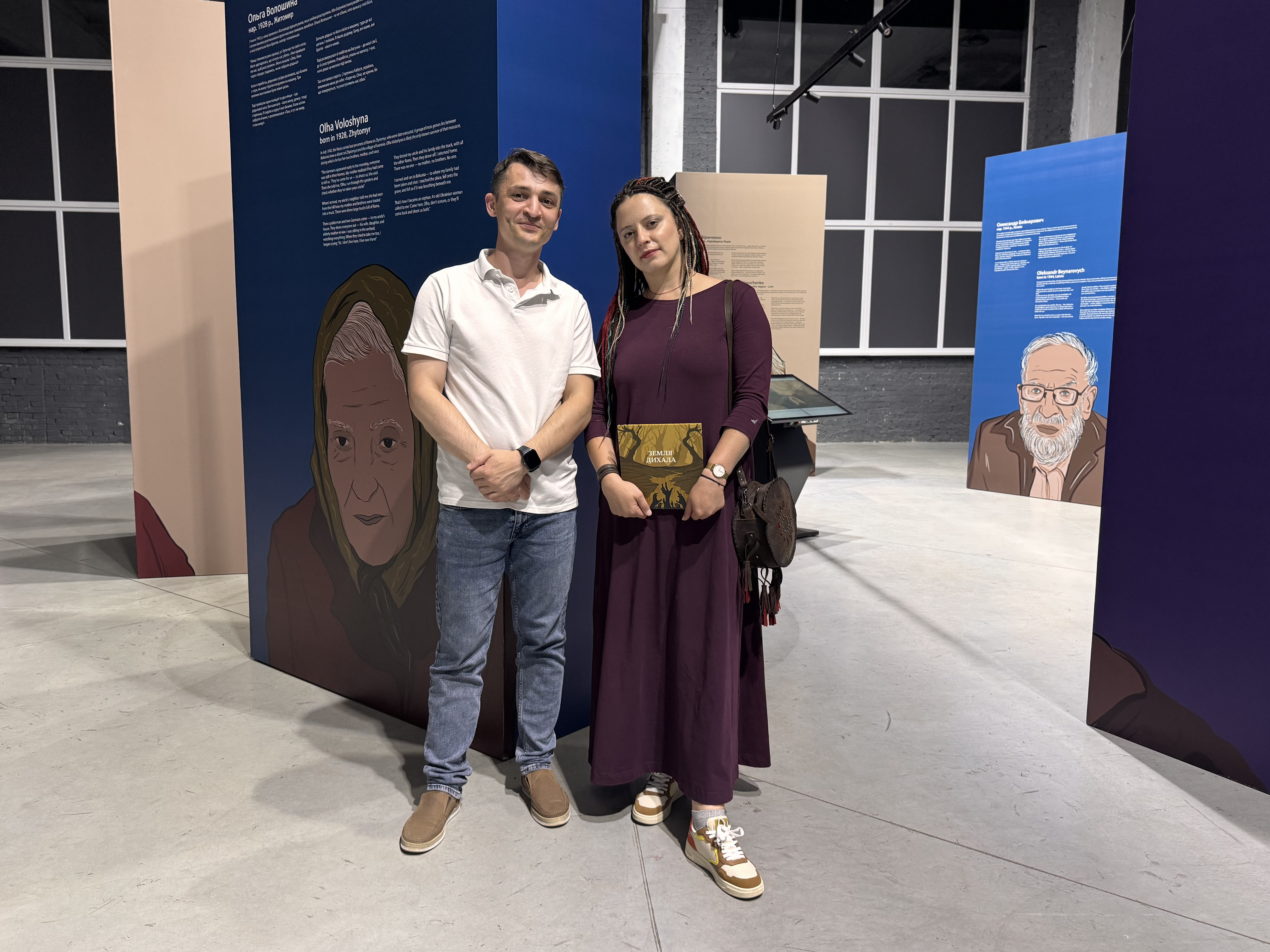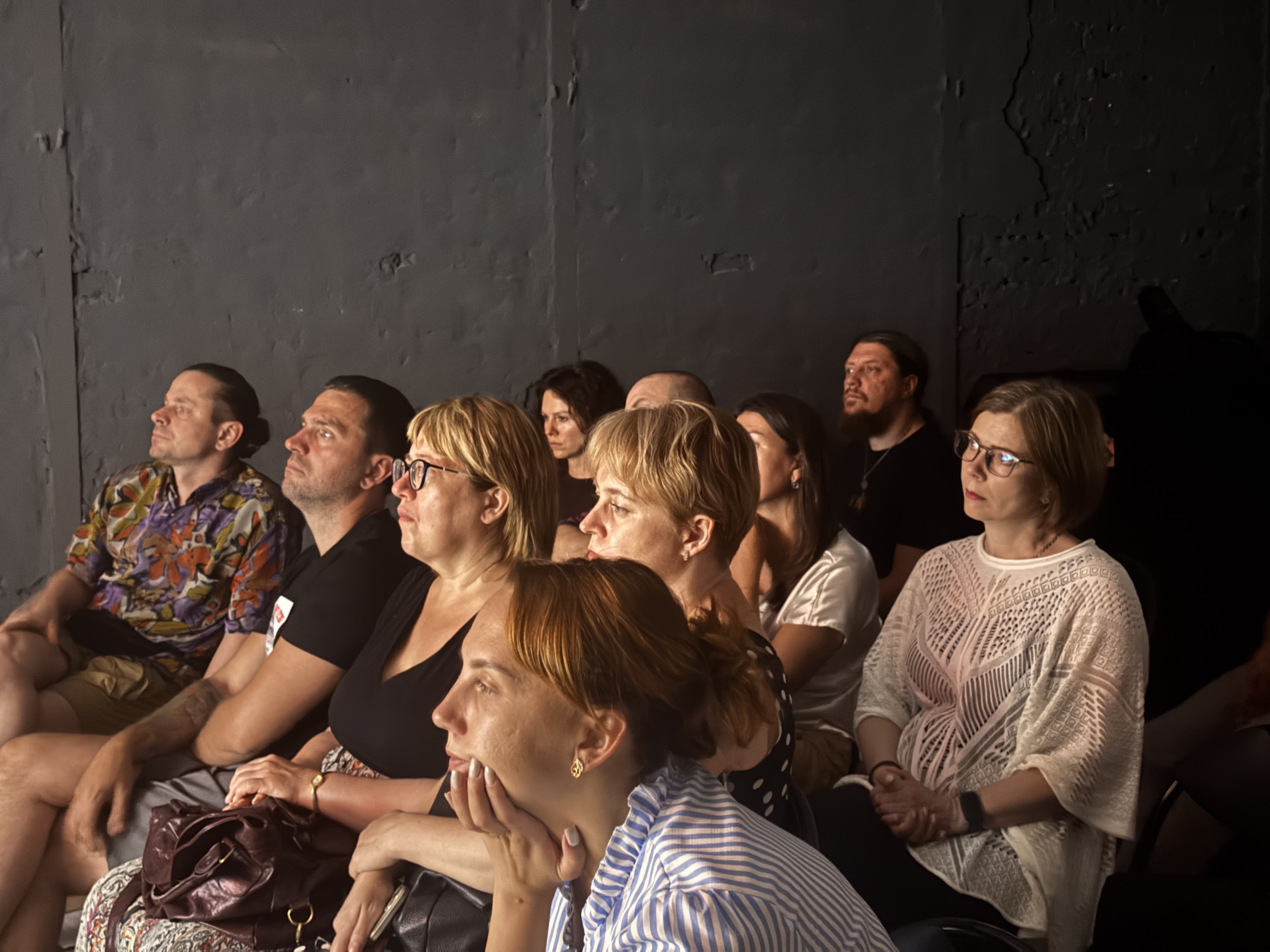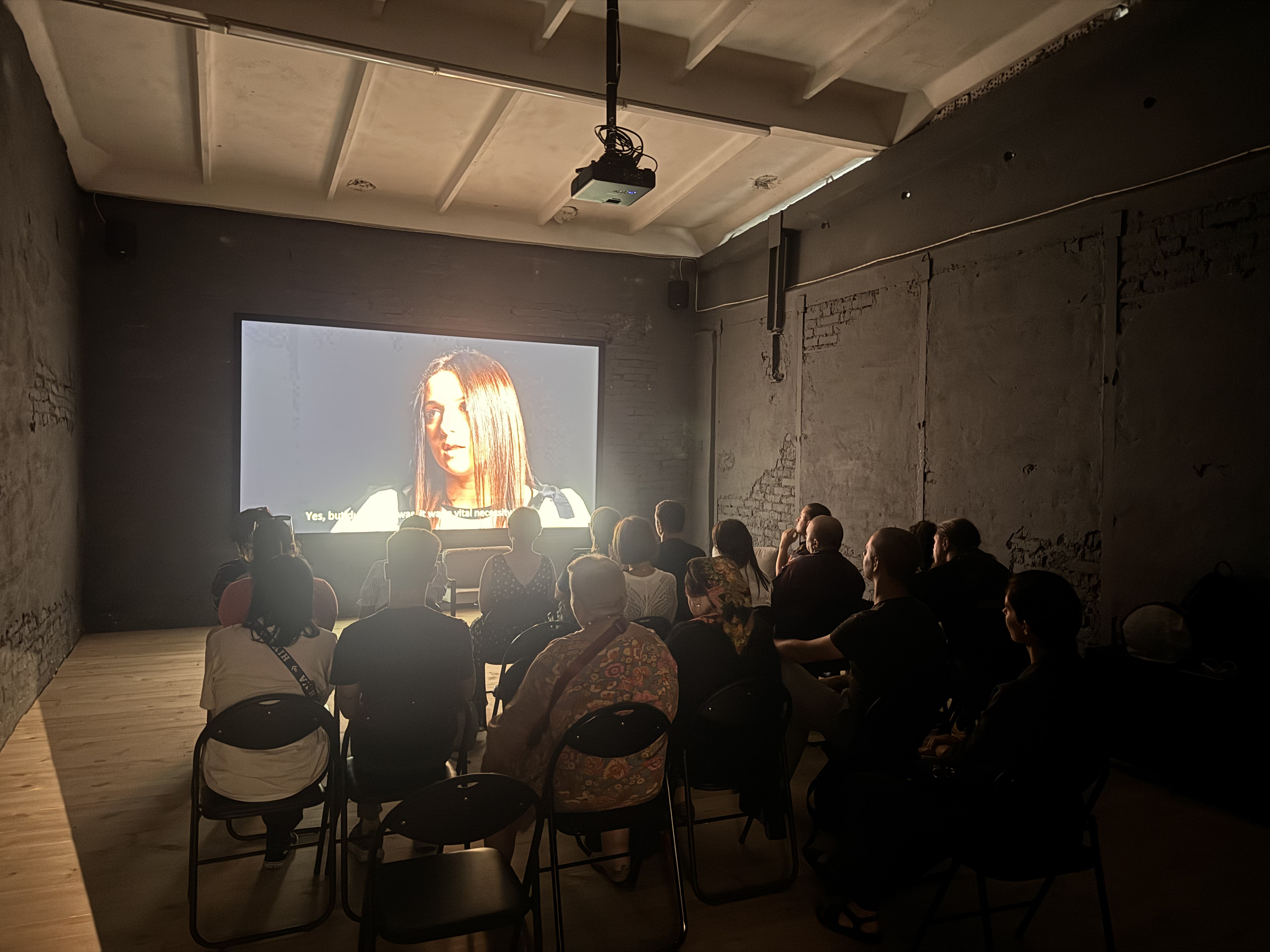A screening of the recorded documentary play Voices That Have Names took
As part of the exhibition Invisible. Resilience: The Past and Present of Roma, hosted at the “Living Memory” Center in Kyiv, a special screening of the recorded documentary play Voices That Have Names took place. Following the screening, audience members had the opportunity to engage in a discussion with the director, Nataliia Vainilovych. The conversation also featured Volodymyr Yakovenko, Executive Director of the Youth Agency for the Advocacy of Roma Culture “ARCA”.
The film intertwines two timelines: the history of the Roma genocide in Ukraine during World War II and the contemporary experiences of Roma communities in the context of Russia’s full-scale war against Ukraine. Drawing upon archival materials and oral testimonies, the film brings together personal stories of survivors and artistic interpretations of those histories. Its central message is to explore how ethnic persecution and prejudice shape individual lives and communal memory — and how silence transforms into voice.
The project's mission is to document and convey the history of the Roma genocide in Ukraine, to amplify oral testimonies and family narratives, to establish a connection between past trauma and present-day challenges, and to contribute to public education and the prevention of future crimes against humanity.
During the discussion, Volodymyr Yakovenko emphasized the importance of artistic engagement in confronting prejudice and raising awareness of Roma history:
“This is not our first work of this kind, nor our first film. Previously, we produced From Home to Home. But Voices That Have Names is not a typical film — it’s a piece of documentary theatre. We realized it would be a great loss if this play was only staged once or twice and then disappeared. That’s why we decided to record it and present it to a wider audience.”
The play is based on interviews with members of the Roma community — both contemporary voices and those who survived the genocide of the 1930s–1940s. These testimonies formed the foundation for the production and enabled a powerful connection between past and present voices.

The discussion also addressed how Roma and other marginalized groups have been treated at different points in history. Attendees shared personal experiences and stories from their own cities, speaking about discrimination and stereotypes they or others have faced. Together, participants reflected on how to overcome biased attitudes — not only toward Roma but toward all minorities and vulnerable groups. The conversation thus became a space not only for dialogue, but for identifying practical steps toward societal change.
“War unites us,” Yakovenko noted. “As the characters in the film said, at the start of the full-scale invasion, the lines between people seemed to dissolve. And that’s something we must remember and preserve.
When we speak about the reconstruction of Ukraine, I don’t just mean rebuilding damaged homes, roads, or infrastructure. For me, it’s first and foremost about reconstructing Ukrainian society. It’s a transition from the Soviet past to a truly Ukrainian future. We need to rethink our past mistakes — our shared mistakes — and make sure we don’t repeat them. We are one nation, and that is our strength. But at the same time, we are diverse — and that diversity is also a source of strength.
I say this not only as a civic activist. Just the other day I was interviewed by a Ukrainian media outlet, and they asked about the same topic the film addresses — how the war has changed attitudes toward marginalized groups. At the beginning, there was greater respect, more support. And if we look at history, we can see parallels — how, under occupation, Roma, Jews, and people from the Caucasus were treated. Those degrading practices — yellow stars and the like.
Unfortunately, I must admit: this positive trend is starting to fade. Last year, I once again heard negative stereotypes about Roma from ordinary people. That’s horrifying. And that’s why I am so grateful for this film. I hope more people will see it — because visibility leads to freedom. When people encounter living, active, educated, diverse Roma, they stop reducing them to the stereotypes that date back to Soviet times.
I’m 40 years old, and I’ve known these absurd prejudices since childhood. Sadly, they are still alive in the minds of many. That’s why films like this are a chance to change the situation,” Yakovenko concluded during the discussion.

Director Nataliia Vainilovych shared a personal story about confronting stereotypes in her own life:
“I was invited to a Roma youth forum. It was a different genre of theatre, where audience members tell their life stories, and actors perform them on stage. It’s not documentary theatre, but it’s very alive and emotional.
We, as actors, came to work with the Roma community, preparing for the performance, changing costumes. And suddenly I realized I was hiding my wallet. I looked around — my colleagues were doing the same. I asked, ‘Guys, what are we doing? We’re here to perform stories from these people, and we’re acting like they’re strangers.’ They replied, ‘Well, you never know who might show up.’ And I realized — we weren’t meeting people; we were meeting an image shaped by mass culture or personal bias.
That realization was painful. Because even though I came to work with these people, some unconscious stereotype still triggered. I might’ve heard something from my mother or had past experiences — and I projected that onto the Roma community without even realizing it. It shocked me and made me stop.
Later, as we got to know each other and even joked around, that barrier faded. But if someone lives like that constantly and doesn’t even notice — they’re easy to manipulate. These biases don’t disappear overnight.
This is a huge problem. It lives in society and won’t go away on its own. My biggest question now is: how do we deal with it? How do we go to people with education and break these stereotypes?”

Thus, the screening and discussion around Voices That Have Names became a space for deeper reflection — from historical memory to the dismantling of modern-day prejudice. This project reminds us: without truth about the past, a just future cannot be built. And the path forward lies through open dialogue, visibility, and mutual respect.
See also
- «Голоси, які мають імена»: відбудеться показ зафільмованої документальної вистави
- The Earth Was Breathing: Comic Book on the Romani Genocide Presented at Book Arsenal
- Screening of the film *"Voices That Have Names"* and discussion with Lesia Pahulich and Nataliia Tom
- 59% of Roman have faced problems when trying to access school education: the results of the research
- A presentation of the book "Russian Colonialism 101"
- Happy holidays!
- Implementation of the Action Plan on Improving the Situation of Roma and Sinti within the OSCE area
- Two-day consultations about y of Socio-Economic Vulnerability of Roma
- Presentation of the #through_my_mind_to_your_eyes project